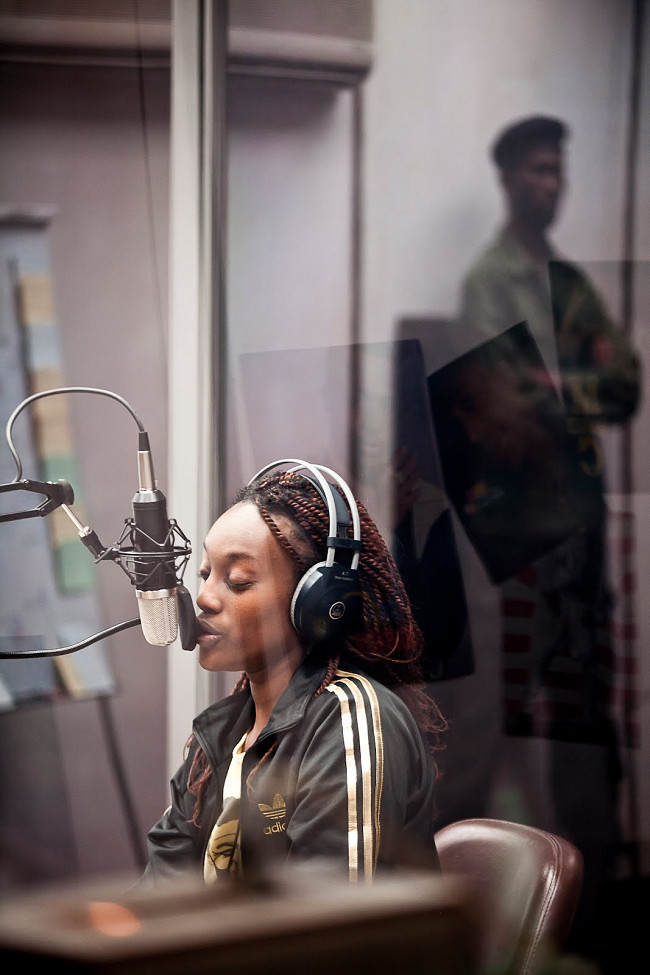Zoë Demoustier
Biography
Zoë Demoustier (1995) is a choreographer and performer. The body is the starting point for her visual performances. She links movement to contemporary and topical subjects, creating documentary choreographic work. She started her trajectory in 2002 with Dromen hebben veters, a performance by kabinet k and fABULEUS. Zoë studied at the Amsterdam Hogeschool for the Arts, graduating in the Mime department in 2017. In 2018 she was awarded a master at the RITCS Brussels. At the moment, Zoë is writing her master's thesis on the embodiment of conflict in contemporary choreography, within the Cultural Studies programme at the KU Leuven. Zoë created the performances nesten (fABULEUS/Anna Bentivegna & Ayrton Fraenk), Road to Nowhere (Forsiti’A/Yelena Schmitz), Born to be wild (Thespikon).In recent years, Zoë has worked as an assistant to Michiel Vandevelde for the creation and tour of Paradise Now (1968-2018) and of choreographer Alma Söderberg, and Iris Bouche/Opera Ballet Vlaanderen. And as a performer together with Kabinet K, David Weber Krebs, Marcelo Evelin and Danielle van Vree. Zoë founded Platform In De Maak, a platform for new makers in performing arts. In 2020 she was awarded the prize for young promise from the city of Leuven. In 2021 she became ambassador of Day of the dance where she created ‘Dancemakers of tomorrow’ together with De Zendelingen. From 2022 on Zoë will start a trajectory together with Ultima Vez who will produce her new work What Remains (première the Krokusfestival 2023).Unfolding an Archive, which premiered in October 2021 is her first solo performance. In this documentary choreographic performance she makes use of Mime Corporel techniques in a strong corporation with sound designer Willem Lenaerts.
Dansmakers van morgen/Zoë Demoustier
https://www.youtube.com/watch?v=GkK6U9MR-e8
https://www.youtube.com/watch?v=GkK6U9MR-e8


Projects
Unfolding an Archive
In Unfolding an Archive, Zoë Demoustier unravels the image archive of her father, Daniel Demoustier, from 20 years of war reporting. Her quest for a relationship to images of world events she grew up with is like a journey that zooms in and out. Her reconstruction attempts to bring the archive to life. She makes a critical intervention by dismantling the mechanisms hidden behind the images her father captured. Gradually, a choreography develops, consisting of poses and gestures in a broken timeline of physical memories set to the sounds of the archive.
Choreography and performance Zoë Demoustier | Live sound Willem Lenaerts | Sound concept Willem Lenaerts & Rint Mennes | Light design Harry Cole | Video and audio archive Daniel Demoustier | Dramaturgy Elowise Vandenbroecke | Coaching Danielle van Vree | Interview & editing Yelena Schmitz | Design & costume Annemie Boonen | Research Annemie Boonen & Willem Lenaerts | Light & technical support Gilles Pollak | With the support of Stad Leuven, 30CC, Platform In De Maak | Residencies STUK, Ultima Vez, Vlaams Cultuurhuis de Brakke Grond, Voetvolk Atelier Rubigny
Choreography and performance Zoë Demoustier | Live sound Willem Lenaerts | Sound concept Willem Lenaerts & Rint Mennes | Light design Harry Cole | Video and audio archive Daniel Demoustier | Dramaturgy Elowise Vandenbroecke | Coaching Danielle van Vree | Interview & editing Yelena Schmitz | Design & costume Annemie Boonen | Research Annemie Boonen & Willem Lenaerts | Light & technical support Gilles Pollak | With the support of Stad Leuven, 30CC, Platform In De Maak | Residencies STUK, Ultima Vez, Vlaams Cultuurhuis de Brakke Grond, Voetvolk Atelier Rubigny
Tour dates
6/10/2021 - STUK Leuven (première)
7/10/2021 - STUK Leuven
27/11/2021 - cc Menen/NEXT festival
10/03/2022 - cc Aarschot (Boze Wolf Festival)
17/18/19/20/03/2022 - OPEK Leuven (Platform In De Maak Festival)
21/22/04/2022 - Nona Mechelen
6/10/2021 - STUK Leuven (première)
7/10/2021 - STUK Leuven
27/11/2021 - cc Menen/NEXT festival
10/03/2022 - cc Aarschot (Boze Wolf Festival)
17/18/19/20/03/2022 - OPEK Leuven (Platform In De Maak Festival)
21/22/04/2022 - Nona Mechelen
This performance can tour in the following periods
- Spring 2022
- Summer 2022Autumn 2022
- Spring 2023
- Summer 2023
- Spring 2022
- Summer 2022Autumn 2022
- Spring 2023
- Summer 2023
trailer Unfolding an Archive
https://youtu.be/n5UqCEkQIkc
Teaser Unfolding an Archive
https://www.youtube.com/watch?v=bjA6KLsIHkQ
https://youtu.be/n5UqCEkQIkc
Teaser Unfolding an Archive
https://www.youtube.com/watch?v=bjA6KLsIHkQ

What Remains
What Remains will be Zoë Demoustier’s first dance production in collaboration with Ultima Vez and het LAB. The premiere is planned for the spring of 2023 at the Krokusfestival Hasselt. What Remains tells a story about beginnings and endings, about standing at the extreme of a lifeline, at the point where you start as a child or where you end as an adult. The poetry of changing as a person, of making memories and the fear of losing them. In What Remains Zoë Demoustier brings two generations together on stage: young children who start life and older professional dancers who are leaving life behind. The outcome of that encounter is a dance performance that exposes the transient body. Looking for physical language in which roles can be reversed, both are strong in their vulnerability. A child carries his grandparent: an older dancer regains his childlike freedom. Who takes care of whom? On stage are four elderly dancers, five children and one musician. The children are between the age of 6 and 10 and come from different neighborhoods in Brussels and Flanders. The old generation consists of professional dancers. These dancers embody the forgotten body, the body that should no longer be visible on stage. Who are those people, that forgotten group? Are they forced to stop because of a changed body?
Tour dates
première: Krokusfestival 2023
More dates will follow
première: Krokusfestival 2023
More dates will follow
Contact
NEXT Arts Festival
Broelkaai 6
8500 Kortrijk
Broelkaai 6
8500 Kortrijk
+32 56 22 10 01
info@nextfestival.eu
info@nextfestival.eu
NEXT Arts Festival © 2025












